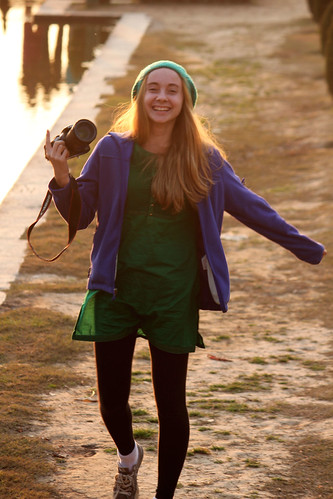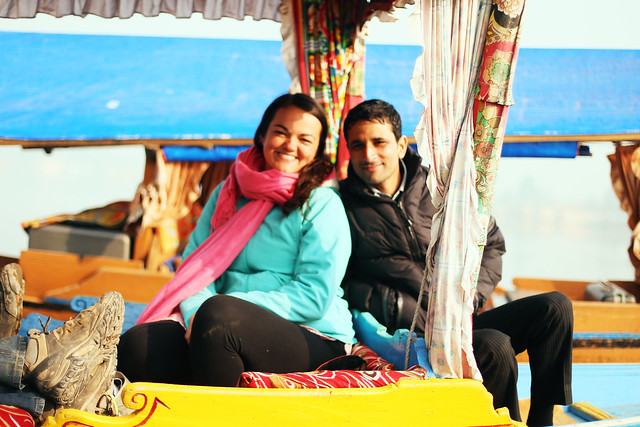Travel begets travel; it's like a gambling habit with both immediately apparent and dormant benefits for the mind and spirit.
As I've explained to many friends and family members, these experiences do not satiate some hungry beast that can eventually become full.
Travel doesn't get out of your system.
Each experience can inspire a realization of the possibility of infinitely more experiences. We clutch our wallets and apologize, pinch our passports and determine the need for more pages, and assure our parents that with experience comes considerable strength to handle what the world bowls our way. Travel begets travel, sometimes begrudgingly and often with too much enthusiasm to weather as a mere human being.
I know this to be true after being semi-nomadic for the better part of six years. Upon my first study abroad in Italy and a concurrent fascination with photographing trash cans, I realized I was in this for the long haul and that it wasn't going to taper off.
I moved on from photographing the beautifully mundane to being obsessed with travel narratives and firsthand experiences of people in other parts of the world. That was my predominant reading material throughout junior and senior year of university. With Into Thin Air by Jon Krakauer, a seed was planted to visit a spectacular mountain range atop a country I only briefly encountered. Those 304 pages predetermined a windy road–through 13 countries in Europe and 6 in Africa–toward the disputed region of Kashmir where I got my fix of the rooftop of the world.
How I arrived in Kashmir
In October 2008, I was five months into a solo trip around the world as a fresh graduate of higher education. The previous location of Lusaka, Zambia treated me harshly, and I approached India with a visible distrust in others and misguided need to micro-manage my trip with a day-to-day itinerary.
Within two days of being in hot and sticky Delhi, I booked a bus ticket to Manali to escape the uncomfortable chaos. The following is a journal excerpt from the morning before my 18-hour bus ride; I was purchasing food for the journey:
Thinking of both my health (mainly avoiding Delhi belly) and the astoundingly low cost of eats, I stopped at stood, confused, in front of an ash-covered bread stand, hoping to score some tasty goods with the nine rupees jingling in my board shorts. A stranger bailed me out of a ‘Lost in Translation’ moment (three rupees a chapati, three chapatis for the road) and then surprised me with his hold on the English language.
Thinking I was ordering my lunch, my new friend Mudi invited me to join him for chow at his shop and inquired about my India plans. I thought this was one of those moments I was read up and prepared for, thanks to a Lonely Planet warning box; he mentioned Kashmir. RING THE ALARM! A SCAM! Oh, the nerve of these Kashmiri poachers…why I let him in far enough to start the schpeal…wasting my last hours in Delhi.
His kindness and ease made me reflect mild interest and appreciation on the outside, but I was working on an escape route inside that would match the suave of his approach. And then he took me to a travel agent, his roommate and lifelong buddy, where the pitch continued.
Ashika, the agent, made his case by pointing at the numerous pictures and newspaper articles on the wall, claiming not only his company’s legitimacy, but their sky-high level of satisfaction from previous travelers. And then they proceeded to call one happy customer after the other, one being an American woman of 24 traveling alone who was at the family houseboat…nice hand, my friends. Each reference affirmed my hopes that these Delhi hooligans weren’t crooks by any stretch of the imagination.
My Lonely Planet laid open on my lap to the page quoting Bill Clinton in 2000: "Kashmir is probably the most dangerous place in the World."
Comforting. The minutes disintegrated, and my bus departure time tested me to make the right decision for my safety, to cut the right wire, to choose the right pill. There was something about these guys and their effortless charisma, not to mention addictive humor; it seemed like they didn’t really care which way I swayed but that I enjoy myself, though knowing Kashmir was the answer to my big travel dreams.
It’s true; I didn’t come for the India of urine stains and city smog. I had taken nine steps toward the mountains of my favorite books, and this major move seemed like the final, appropriate choice for the tenth step.
It was in this moment of intense contemplation that I first heard the phrase, "If you think too much, nothing will happen," a travel tip I once shared with TGS students at a special ceremony. Its first utterance caused my immediate surrender to the adventure ahead.
How I came to lead students into Kashmir
We now venture five years forward to the present. Three months into living in India, we decided as a traveling high school to offer another opportunity for the students to see just how diverse our host country is. This being impossible in a meager four months, the faculty pitched six different ideas for travel from which the students could choose to explore their own interests.
I was immediately desperate to make a trip happen in Srinagar.
Prior to this opportunity, I talked the ears off my students about my previous trip up north, especially those kids who were not convinced India was a country they could enjoy. This was disheartening, and I made it my mission to plant in all of them a confusing, hypnotic allure of the Subcontinent.
A couple weeks after my Srinagar trip was carved out, I receive an email that ten eager students were ready to join my trip, along with an even more enthusiastic Math teacher, Guillermo. Finding a moment in the students' schedules to squeeze in a pre-trip session to mentally prepare was a near impossible feat only feasible by a magician. So, I settled with a 20-minute tea time on the quad when I gave them time to write, my schpeal on the religious curfew going on at the time, and a relevant mess of articles to have on hand in the location.
I knew they wouldn't be able to understand the complexity of the conflict in Kashmir. Heck, most of them haven't heard the Led Zeppelin song, let alone anything about the state/territory. Instead of bombarding them with articles, I experimented with requiring them to read only enough background information to get started, and then I encouraged them to keep the rest on their iPad to reference when necessary.
I gave them a vague packing list, a butt-crack-of-dawn departure, and a BBC documentary to watch on the flight. When they stepped foot off the plane, their energy was palpable. So was mine.

Have you ever been on a trip that you knew was so special: every detail seemed divinely delivered, every moment one to journal about, every vision worthy of an Instagram? This was the sentiment possessed by all involved in our trip. Lazy nights spent huddled around the fire were coupled with songs or thoughtful talks about travel. Morning breakfasts of toast and eggs were savored as if they were completely new foods. Even in moments where the students were out of their element, up before dawn, freezing, or pushed to their physical limits on hikes, they were still so engaged. The usual shyness of students in need of filtering questions through their teachers to the guides dissolved after a half hour on the ground. The students loved Ashika.
I was thrilled to book the trip with the family I traveled with previously. Ashika, my travel agent on the first trip, helped me craft an itinerary that offered the perfect balance of breadth and depth, flexibility and activity, learning and reflection. He knew the main purpose of our trip was not to be pampered and take photos (though most of the kids were photographers) but to better understand through experience what Kashmir has been dealing with since Partition.
One morning in the mountains, I was sitting next to Ashika and having breakfast by the fire. Students were playing guitar, toasting bread on the ashy stove, and trying their tea with a spoonful of corn meal (like the mountain men do). I tried to wrap my head around the difference between the curfew I experienced in 2008 and the curfew the kids almost witnessed for Muharram. As he unfolded the two situations, I grew to realize just how dangerous my curfew experience was versus the more recent one of a purely crowd-limiting motivation.

Mid-way through the conversation, the room silenced, and all ears perked to absorb the political realities of their current environment. I saw one girl get her iPad out to reference the article I required previously and also read up on the articles about curfew over the years. Other kids grabbed their Moleskins to jot down notes. Soon I had to fight for Ashika's attention along with the kids. He revealed stunning insight that made us truly grasp just how complex the conflict is (and how difficult it will be to resolve). Breakfast stretched two hours long.
Guillermo was an ideal partner for leading this trip, because his primary interest seems to be understanding humans and pursuing greater truths. He helped me sculpt the conversations and reflections in order to facilitate a progression of understanding. He announced in the middle of the trip that everyone was going to take part in a round table discussion, one they would attend representing one of the major groups involved in the conflict: India, Pakistan, the Separatists, and China.
The morning we prepared to leave, we surrounded the fire in Moonshine Houseboat and proceeded with the discussion, which was recorded to share with the rest of the school. What started as a consideration of land ownership in Kashmir expanded to include cultural identity, religion, and economics in a forum akin to a Model United Nations committee hearing. Half-way through the conversation, breakfast arrived and lingered in the form of toast crunches and Kashmiri tea pours in the background of the audio.
It was one of those not-so-rare moments at TGS when I listen to my kids say amazing things and engage far more than a typical teen would.
We returned late in the evening, exhausted from travel and constant elation. We didn't want the trip to end, nor the unique bond we forged between students and staff. The 6D Cinema in the airport terminal certainly extended our mental vacation up until departure, but upon returning to campus, we knew we had left behind a great experience that was still being processed.
We called a couple tea times mid-week to savor the flavors we remembered and share those moments with others. Through the mouths of my students, I heard further assurance that travel does beget travel, for all of them expressed not only interest in visiting Kashmir yet again but were determined to arrive a mere beat after their high school graduation. And the students who had previously expressed disinterest in India as a whole had changed their tune. Kashmir had a culture and a spirit they couldn't have anticipated loving, and this rocked their idea of the Subcontinent to the core.
Two wonderful things about my traveling students being exquisite photographers were: 1. we came away with an incredible pool of images (seen below) that encapsulate the beauty and joy of the trip, and 2. I was able to step out from behind the lens and just be present in the place that called me back five years later.
Where are you being called back to?




